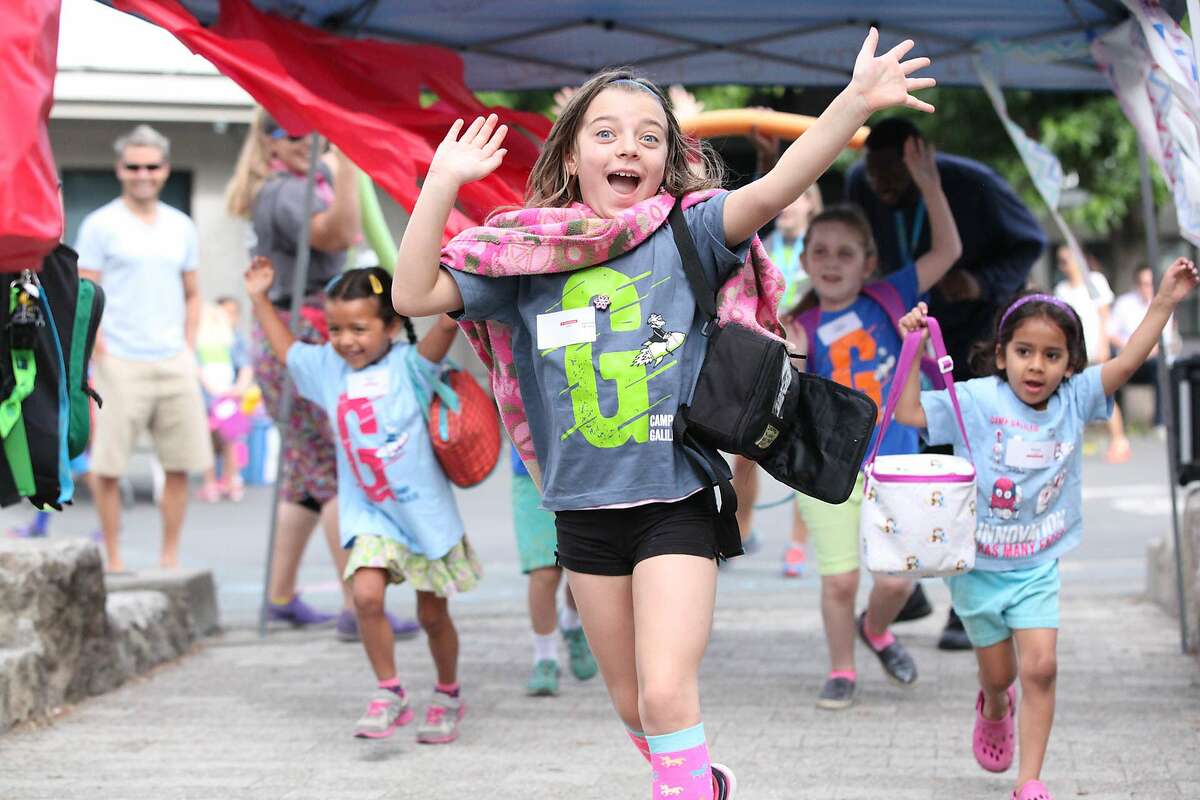Popular Bay Area summer camp that filed for bankruptcy holds $12 million in fees, documents show
Aidin Vaziri May 8, 2020 Updated: May 8, 2020 11:01 a.m.Comments
4
1of4Camp Galileo runs 70 summer programs in the Bay AreaPhoto: Camp Galileo

Camp Galileo, an Oakland children’s summer camp program with 70 locations in the Bay Area and beyond, has filed for Chapter 11 bankruptcy, blaming financial setbacks caused by the coronavirus pandemic.
The company sent an email to registered families announcing its decision to voluntarily file for bankruptcy protection on Wednesday.
It is not offering refunds.
“While we had very much hoped to avoid turning to the courts, the severity of the pandemic economic crisis and the complete cancellation of our 2020 in-person camp season has made business as usual impossible,” said Jessica Berg, spokesperson for Galileo Learning LLC, in a statement to The Chronicle.
With 45,000 children enrolled in its camps in California, Colorado and Illinois, the company took in approximately $12 million in tuition this summer, according to bankruptcy documents.
The company claimed that number represents one-third of the expected revenue Galileo had been planning for 2020. The average cost of a weekly program is $400.
Coronavirus Coverage

Galileo founder and CEO Glen Tripp left many parents angry when he initially announced the decision to pull the plug on the program’s summer season on April 16 without offering registrants compensation for fees paid.
The company, which said it was forced to furlough or lay off 80% of its 140 employees, instead offered families credit to a future session and a free virtual camp.
The decision to reorganize under the Chapter 11 statute came after Galileo said it attempted to make amends with enrolled families through a poll that asked parents whether they would like a full or partial refund or a credit for their 2020 enrollment fees.
“While we had hoped that the number of requests for refunds from families would be manageable — and we were buoyed by the number of families who expressed both compassion and support for Galileo — unfortunately the refund requests far exceed Galileo’s current financial means,” Berg said.
Many families that reached out to The Chronicle said they never received the poll.
Galileo is additionally holding $6,244,000 in other accounts. The bankruptcy documents show that sum includes a $500,000 disaster loan from the Small Business Administration and a $2,539,805 Paycheck Protection Plan loan implemented through the CARES act.
“I am a single mom and run a very small business myself,” said Katie Piro, a parent who had registered for the summer season. “We all feel it. My daughter is enrolled in four summer camps and Galileo is the only one managing it so poorly. Many are reaching out and working with parents, moving dates and working with county regulations. Everything about what Galileo has done is shady. I feel they are using COVID as an excuse for their shady financial dealings.”
According to the documents filed with bankruptcy court, Galileo hopes to offer families a 110% credit toward its online camps this year, or a 50% credit toward for its programs over the next five years.
Tripp declined to comment to The Chronicle, but in a statement he said, “When I think about how far we’ve come over the last 18 years, my heart goes out to our Galileo community. Just like thousands of other small businesses, we are not going to give up and let this pandemic win — we are absolutely resolved to figure out a way to continue bringing joy to families for many more years to come.”
On April 23, a class action lawsuit was filed in United States District Court for the Northern District of California, seeking alleged damages of $20 million against Galileo and Tripp.
Despite the setbacks, Berg said the camp, which began in 2002, hopes to return with a full summer program in 2021.
With the pandemic still raging, Galileo joins a long list of summer camp programs that are struggling to figure out how to move forward.
Girl Scouts of Northern California decided to delay the start of its 2020 camp season to July 19, canceling the first four weeks of its scheduled nine-week program. Camp Edmo has switched to an online model. Both those camps offered families full refunds.
Other regional camps — including those run by the San Francisco Recreation and Park Department, YMCA and the Jewish Community Center of San Francisco — are still weighing their options for the summer.
The latest Bay Area order, effective as of Monday, allows summer camps and other educational or recreational programs to reopen as long as they serve a stable group of 12 or fewer children. The caveat is that they can only serve families of essential workers, those who perform outdoor jobs or minimum basic operations.
“In the coming days, as more employees are allowed to go back to work, family eligibility guidelines for childcare and summer camps will change accordingly,” a spokesperson from Children’s Council of San Francisco told The Chronicle.
Aidin Vaziri is a San Francisco Chronicle staff writer. Email: avaziri@sfchronicle.com
No comments:
Post a Comment